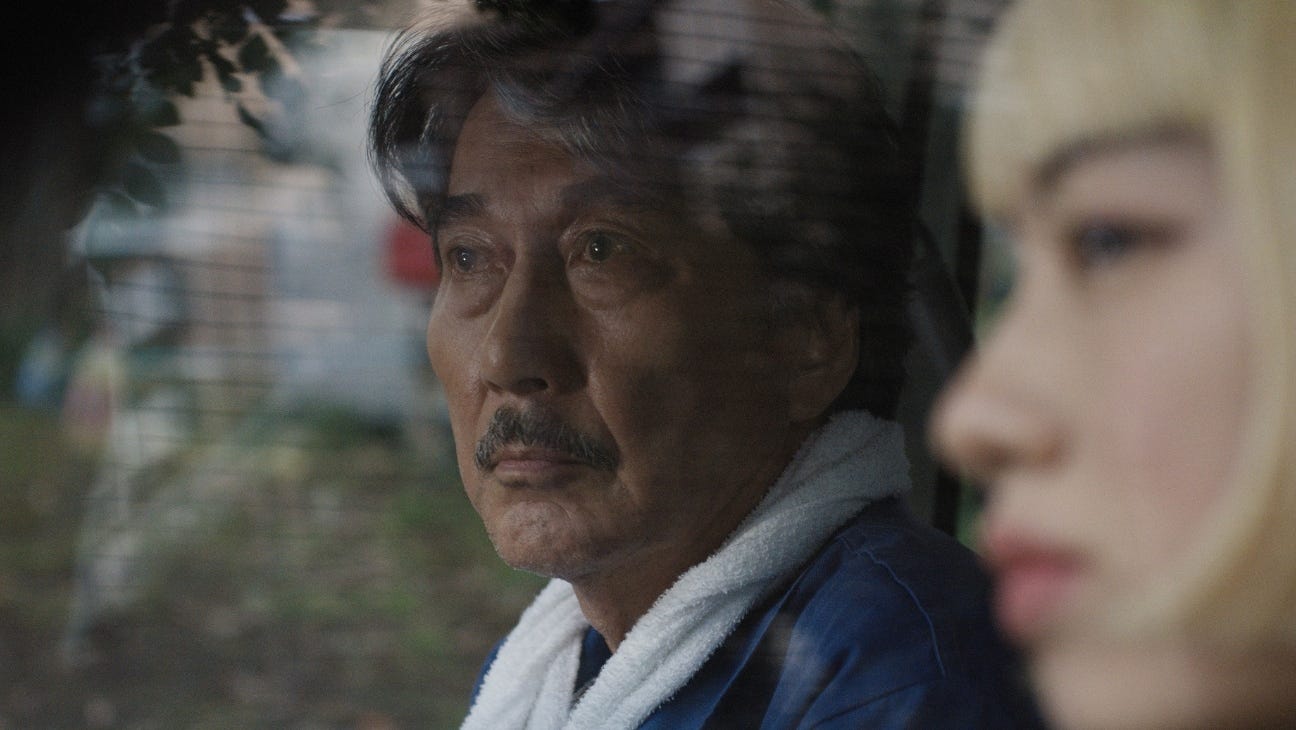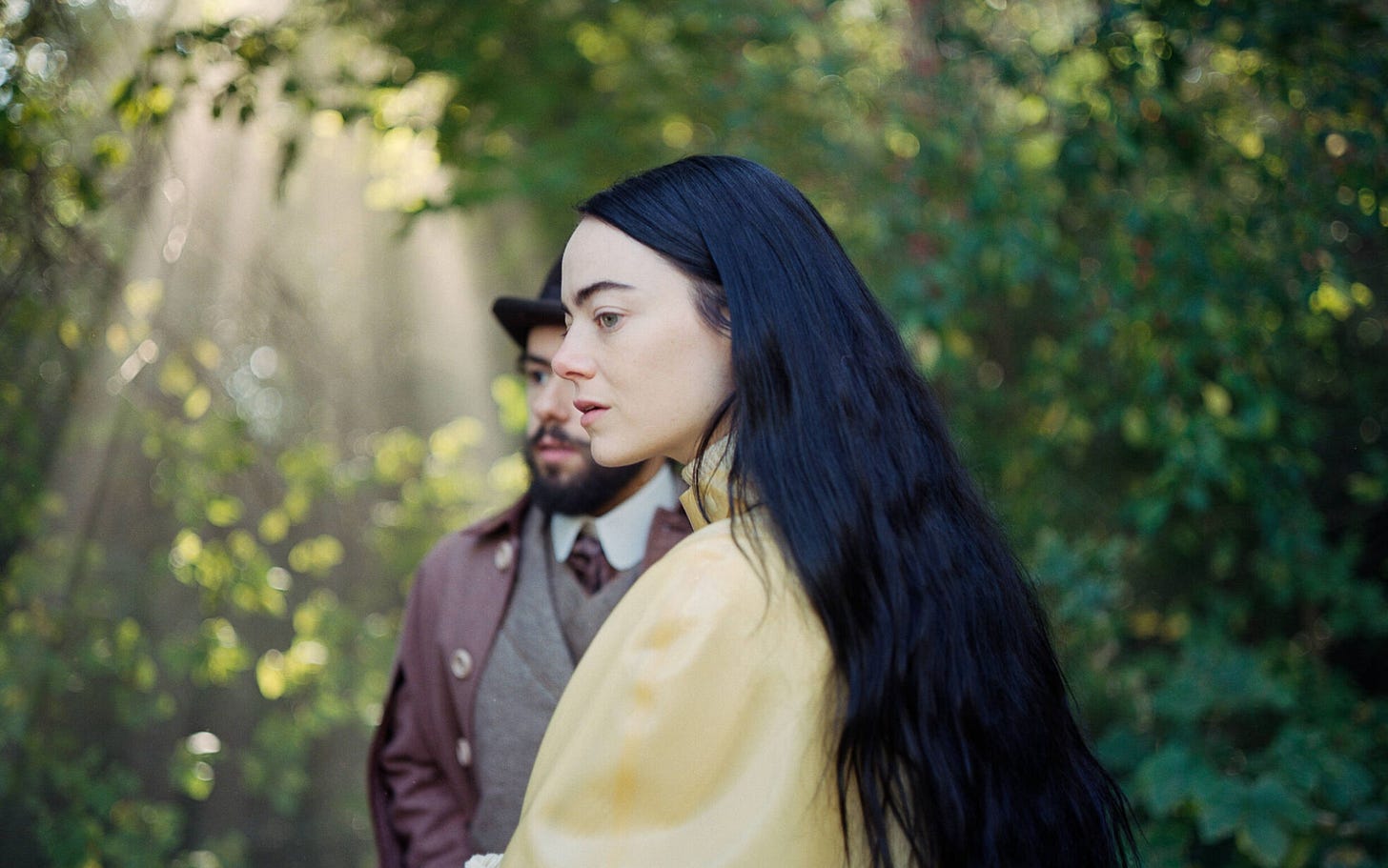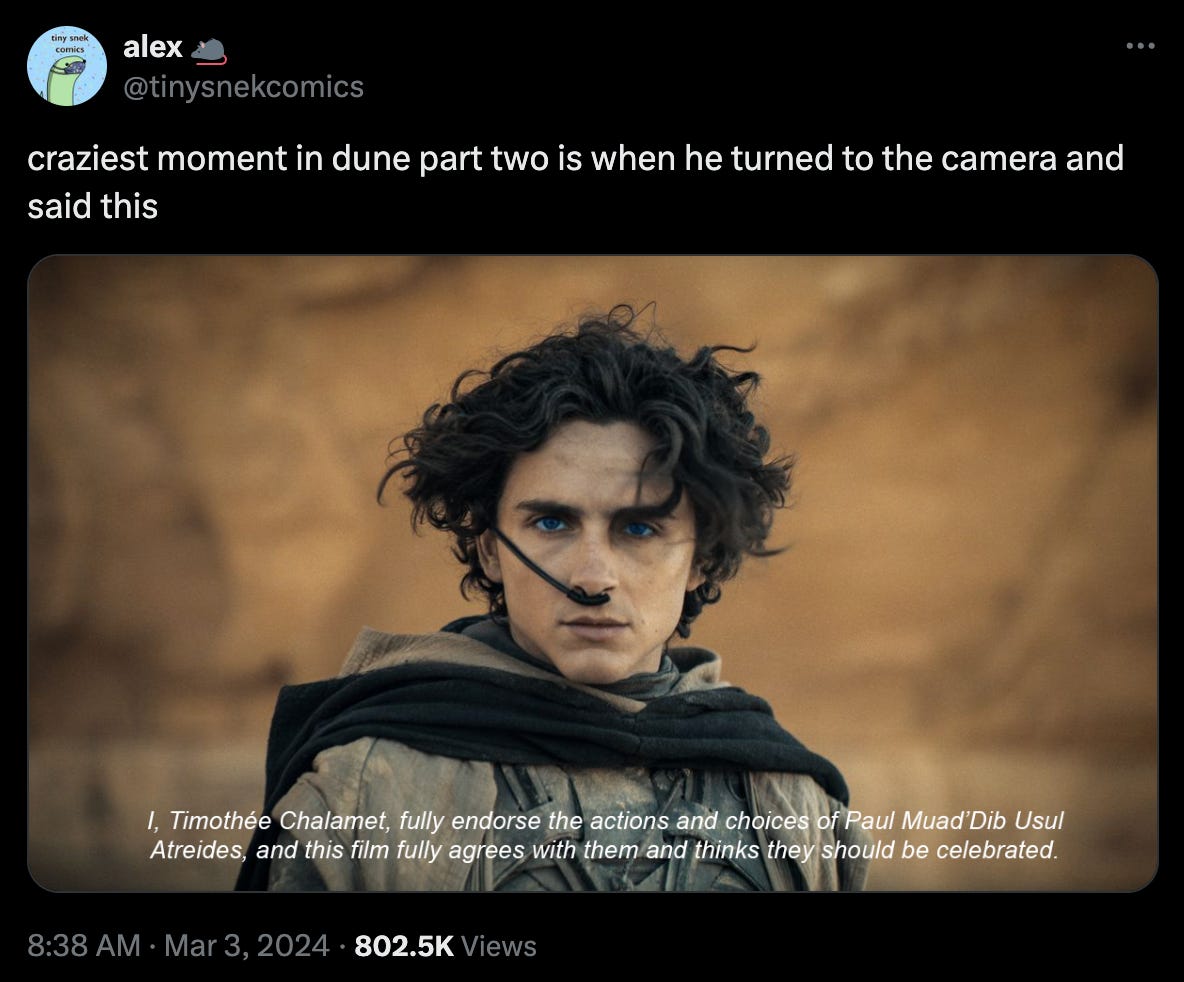Poor Days and Perfect Things pt. I
On the latest cinema galore and public opinion
"How was 'Poor Days'?" my friend asked. Although I immediately knew she was asking about Wim Wenders’s 'Perfect Days,' I laughed out of happiness, considering the abundance of good movies we've received this year in a very short period. So much so, titles seem to not matter so much. 'Poor Things' was the movie I couldn't stop talking about throughout December, until one day I woke up feeling my obsession fade.
These past two months I have found myself going to the cinema with unprecedented frequency. It started with Miyazaki's 'The Boy and the Heron,' followed by 'Poor Things,' 'The Holdovers,' 'Killers of the Flower Moon,' 'Perfect Days,' 'Priscilla,' and finally 'Anatomy of a Fall,' which left me wanting to abandon my group of friends and wonder aimlessly trying to understand the feelings this movie stirred in me. The only issue with all this cinema-going frenzy is the impossibility of being in a mental state suitable for all these experiences equally. I’m waiting for the time I’ll re-watch some of them probably understanding better why any of those films meant so much or so little to different people. Another pitfall was my extensive exposure to the Internet, making it hard to enter the cinema free from public opinion. Letterboxd is my latest vice, and it’s starting to consume my experience with films. Halfway during a movie and I’ll already start thinking about my little short essay on why this movie made sense to me or not. I believe I'll soon need a Letterboxd detox.
The renewed public interest in cinema should be a positive thing, right? Yorgos Lanthimos getting a wide audience should be another good thing no? Oh wait… I'm not sure how I've come to write about this director. I never imagined Lanthimos would be so popular. Who would have thought? Yet, here he is, trending because he's either criticized or praised, for all the wrong reasons.
Lanthimos holds a special place in my heart, not because I'm fond of his fisheye lenses or understand whether his directorial style is good. When I say "I like Lanthimos," I mean I appreciate Efthymis Filippou, the screenwriter he often collaborates with. I enjoy the abnormal language presented in a realistic yet comedic chaos, the weirdness he forces upon you, the exploration of the edges of human nature. Metaphorical societal oppression and so on. I appreciated his emergence during a time when nothing in Greece made sense. His eccentricity has a very culturally specific madness. Yet, I always thought he would remain an eccentric figure, watched by maybe a hundred people at most in Greece, given that more than fifty percent of Greeks still despise him. Unfortunately for some, he’s now receiving bigger opportunities and a wider audience. This has led to eye-rolling comments from those who think he is undeserving of such attention.
"I don't know, I think he needs therapy," a friend remarked. All I could think of was that he probably heard that on TikTok or read it in a review by some obnoxious cinema critic at El País. What I wanted to say that night was that Lanthimos has likely undergone therapy and emerged realizing that very little in this world makes sense. However, I didn't sweat it. Some insights must be arrived at independently, and if they aren't, perhaps they're not meant for you, which is okay. I'm not concerned about a world where everyone agrees, nor do I need my friends or lovers to conform to such opinions. At the same time, do I think that the world need more Lanthimoses though? Not really.
'Poor Things' made a splash upon its release, and its distribution company's extensive advertising ensured that everyone and their mother went to see it. The script, based on a novel of the same name published in 1992, unfolds in Victorian England and is clearly fictional. It begins with a pregnant woman committing suicide, a mad scientist deciding to transplant the fetus's brain into her head, resurrecting her as a creature that is neither a fully grown woman nor a baby. From the start, the premise is ridiculous. Both the book and film adaptation introduce themes of patriarchal control: the protective father/creator, the naive assistant who falls in love with the creature under the pretense of protection, and a lascivious lawyer whose sole purpose is to boost his ego and self-validation by conquering what everyone else is so fiercely guarding.
In this narrative, the creature, Bella Baxter, strives to grow, explore the world, understand, and build a sense of self. She is courageous, with immense trust in the goodness and future. Despite of a lot of bad things happening to her, she perseveres. An important subplot involving her sexuality provokes outrage among puritans and politically correct audiences. She discovers self-pleasure and sexual pleasure. The men in her life exploit this, yet the public assumes the director and producer—Emma Stone herself, a woman—endorse such behavior.
"It's a film made by a white man, thus catering to the male gaze," "It promotes pedophilia," and other absurd comments have flooded the Internet and media in recent months. "Women who liked the movie are experiencing internalized misogyny," "Barbie was far more feminist."
Listen, it's a movie, a piece of fiction set in a fantastical world. None of it is meant to be taken literally - I hope. However, as a woman who was once a late teenager and young adult, having experienced older men trying to claim me, what I saw in 'Poor Things' was a reality that exists in this world and in my eyes, there was nothing accepting about the behavior. On the contrary, the way the story is presented makes it clear to mature audiences that the situation is twisted by all means. Alas, there is a potential path one could take, where despite people, particularly men, try to take advantage of you, you can still possess agency in your experience. You recognize some folks might be detrimental to you, yet you explore a reality with them because it somehow makes sense for you at the moment, until it no longer does, and hopefully then you move on, a grown self.
I adored the character of Bella Baxter - with her autism and obvious chaotic character and all. I feel quite sad for those who couldn’t enjoy the film because someone on Tik Tok or Twitter told them it was bad and misogynistic. I loved Mark Ruffalo's character, the lover who believes everyone desires him, yet he's too noble to commit. "You'd be wise not to fall in love with me," he warns Bella Baxter, only to go mad months later when she not only fails to fall in love with him but also outgrows him. He was just a vessel for experience and his ego didn’t let him fathom that possibility. I felt seen and understood by this supposedly "white male gaze" film. Countless times, when lovers advise us not to fall too deeply for them, we wish we could respond, “My guy, you are not that important. I’m unfortunately horny and heterosexual and you happen to be somehow interesting for now. Most of the things I like about you I’ve probably projected on you anyway. Chill.” but we don’t dare say that because we still need their cooperation in this love game. All we probably manage to say is “Yes, this is casual, don’t you worry babe”.
I’m also critical to those who defend the film as a feminist take, empowering. I’m not even sure where the narrative of female empowerment started. Was it the production company trying to create some noise? Excited fans? It's not the one folks. If you're looking to grasp patriarchal concepts and "save" women, a film won't suffice, my sincere apologies. It might prompt some thought, encourage you to see things differently, but you must want that for yourself. If you're keen on educating yourself about how society has been shaped by gender structures, there's a wealth of literature to explore, and even that alone isn't enough. You'll need to question everything you've ever thought about your existence and the world, and keep questioning, until maybe, just maybe, you understand a bit more. It's a process. Again, one film won't achieve this, especially this one.
Lanthimos's 'The Favourite' is his genuine attempt to place women at the forefront of one of his films. It's a darkly humorous comedy. No one debated whether he was "doing feminism right" back then because the film wasn't marketed as such, and perhaps that's the issue haunting 'Poor Things.'
The controversy surrounding 'Poor Things' reminds me of the public's reaction to Nabokov's 'Lolita.' Many of its critics have never read the book. I hate to say it, but those who have read the book and still believe Nabokov endorses pedophilia are likely not the sharpest tools in the shed. Humbert Humbert's downfall in 'Lolita' is masterfully depicted. Nabokov, a genius of the written word, tackled a very real issue with such finesse and respect for his readers. He didn't assume his readers too unintelligent to grasp the narrative nor did he feel the need to add a disclaimer stating, "I am depicting a knowingly perverse situation here; I do not agree with or endorse Humbert Humbert's actions." Today, a modern reader of 'Lolita' might feel compelled to nod their head in disagreement, lest someone misinterpret their interest in Nabokov's literature as support for pedophilia. It's comedic really.
The 'Poor Things' drama has left me somewhat frustrated and weary, but I remind myself that public opinion should never dictate one's personal views. This world is diverse, and perhaps those things that endure are precisely those that nobody can unanimously agree on. Time will tell whether this movie or this story was worthwhile. I'll check back in twenty years. In the meantime, I can’t wait for Lanthimos to go back to his roots and stop making Hollywood movies - aka Poor Things - so I can frown and feel disturbed in peace, away from the TikTok critics.
The disparity in film perception was even more pronounced when watching Perfect Days by Wim Wenders, for entirely different reasons though. My friend and I exited the theater with completely divergent interpretations of what the film was about. P left feeling content, with a smile on his face, whereas I was left profoundly sad.
The Perfect Days experience deserves its own essay, so I'll save that for another time. Right now, I need to get ready to watch Dune II, and this time, the Internet concurs that it's fantastic. Not that it matters, because I'm excited anyway. As Nicole Kidman said about cinema in her ACM ad, "We come to this place for magic..." and I am confident Dune will fulfill that promise. I can't wait.
[Update 21st of May 2024]
The ‘Perfect Days’ essay is still in draft, and I had hoped not to discuss Lanthimos, feminism, and related topics for a while. However, a recent event has further diminished my faith in the state of pop culture discourse and the prevalence of illiteracy.
A few days ago, at the press conference for Kinds of Kindness, Emma Stone had the opportunity to provide a clear response to the narrative about whether Poor Things and Lanthimos's work are misogynistic. Unfortunately, she missed this chance badly.
She seemed tired of the specific conversation—a sentiment I understand and empathize with completely—but also came across as very self-absorbed and defensive in her answer. In her attempt to dismiss the basis of the reporter's hypothesis, she gave the most banal explanation, something along the lines of, "I focus on the technical and artistic aspects of my profession and am not the kind of actress who wants to convey a specific message." I don’t think that’s entirely true, but alas, that’s what we got.
Likewise, the journalist, who has apparently been in this business for decades, asked the question in the most clickbait way. She first declared, “Congratulations on this magnificent movie”—a statement she clearly didn’t believe. Then she described Lanthimos's work as a Trojan horse on social conventions—whatever that means—and proceeded to ask Emma Stone how she feels she’s contributing to feminism by working with him. To my ears, the question implied a disconnect between being a feminist and working with Lanthimos. Perhaps the reporter—given that English is not her first language—intended to ask something different or sincerely wanted a clear answer from Emma Stone to the allegations of the past year. Emma Stone responded with irony, and the reporter attempted to rephrase her question to make it seem less polemical. It was a disaster from both sides. The journalist should have prepared better, and Emma Stone should have known better.
Then came the internet comments, applauding one side or the other. It was a catastrophe, people. A professional lost their integrity for the sake of sparking pop talk, and an Oscar-winning actress proved much less intelligent than we might have thought. This whole ordeal reminds me that most famous people are not as sharp as we might believe, although in the case of Emma Stone, I think she’s just become overly defensive at this point.
In any case, it feels we need to go back to our desks and sit down to think like little kids in primary school because ignorance is gushing out dangerously.




